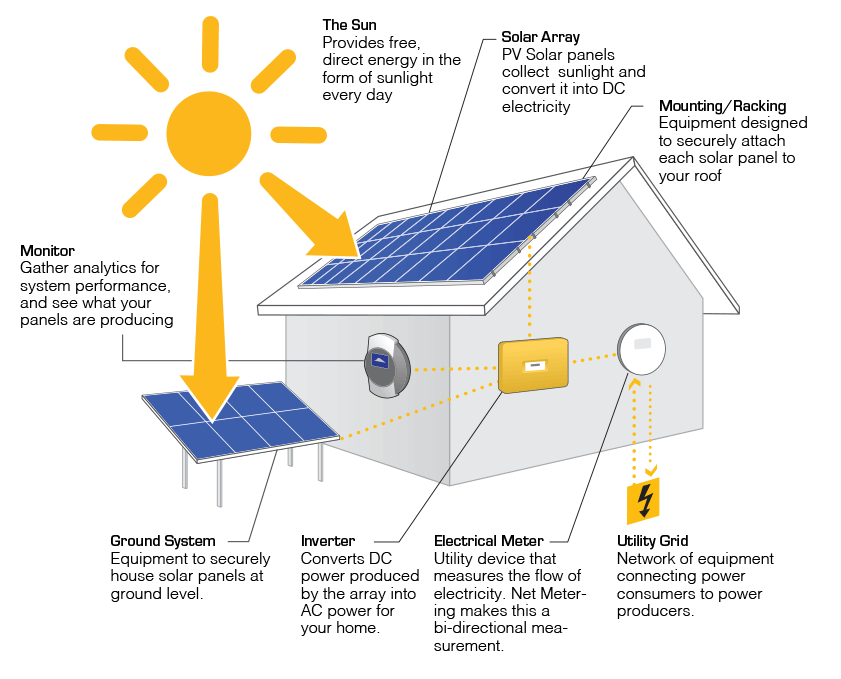This article discusses How To Tell If My Solar Panels Are Working, hopefully providing additional knowledge for you.

How to Tell if My Solar Panels Are Working: A Comprehensive Guide
Solar panels have become increasingly popular as a sustainable and cost-effective way to generate electricity for homes and businesses. However, it is important to regularly check whether your solar panels are working efficiently to ensure maximum energy production and savings on your energy bills.
This comprehensive guide will provide you with detailed instructions and expert tips on how to tell if your solar panels are working, helping you maintain their optimal performance and maximize your investment.
Visual Inspection
One of the most straightforward ways to determine if your solar panels are working is to conduct a visual inspection. Look for any physical damage, such as cracks, broken cells, or discoloration, which could affect their functionality. Additionally, check for any loose wiring or connections that may disrupt power flow.
You should also observe the cleanliness of your panels. Dirt, debris, or bird droppings can accumulate over time, reducing the amount of sunlight reaching the photovoltaic cells and hindering their ability to generate electricity. Regular cleaning is essential to maintain optimal performance.
Electrical Monitoring
Electrical monitoring can provide more precise information about the performance of your solar panels. You can use a monitoring system or a multimeter to measure the electrical output of your panels and compare it to the expected output based on the system’s specifications.
To measure the output, disconnect the system from the grid and connect the multimeter to the positive and negative terminals of the solar panel. Set the multimeter to measure DC voltage and place the panel in direct sunlight. The voltage reading should be within the range specified by the manufacturer.
Performance Monitoring
Performance monitoring systems provide real-time data on the energy production of your solar panels. These systems track various parameters, such as voltage, current, and power output, and allow you to monitor the performance of your system over time.
By comparing the performance data to historical data or industry benchmarks, you can identify any significant deviations that may indicate a problem with your solar panels. This data can help you troubleshoot and address any issues promptly, ensuring consistent energy production.
Latest Trends and Developments
The solar industry is constantly evolving, with new technologies and advancements emerging regularly. Staying updated on the latest trends and developments can help you optimize your solar panel system and maximize its efficiency.
One of the most significant recent developments is the integration of artificial intelligence (AI) and machine learning (ML) in solar panel monitoring systems. These technologies can analyze performance data and identify anomalies or potential issues, enabling proactive maintenance and preventing downtime.
Tips and Expert Advice
In addition to the aforementioned methods, there are several other tips and expert advice that can help you assess the performance of your solar panels:
- Check your energy bills: Compare your energy consumption before and after installing solar panels. A significant reduction in your energy bills is an indicator that your solar panels are working efficiently.
- Monitor your inverter: The inverter converts DC power from the solar panels into AC power for use in your home. If the inverter is not functioning properly, it can affect the overall performance of your solar system.
- Look for shading: Obstructions such as trees or buildings can cast shade on your solar panels, reducing their energy production. Identify and minimize shading to maximize sunlight exposure.
By following these tips and seeking guidance from solar experts, you can maintain the optimal performance of your solar panels, ensuring a consistent and reliable source of renewable energy.
Frequently Asked Questions
-
Q: How often should I inspect my solar panels?
A: It is recommended to perform visual inspections at least once a month and more frequently during extreme weather conditions.
-
Q: What are the signs of a malfunctioning solar panel?
A: Physical damage, decreased energy production, and abnormal electrical readings can indicate a malfunctioning solar panel.
-
Q: Can I clean my solar panels myself?
A: While it is possible to clean your solar panels yourself, it is generally recommended to hire a professional solar panel cleaner to ensure proper cleaning and safety.
-
Q: What is the lifespan of solar panels?
A: The average lifespan of solar panels is around 25 to 30 years, with minimal maintenance required.
Conclusion
Knowing how to tell if your solar panels are working is essential for ensuring optimal performance and maximizing your investment in renewable energy. By following the steps outlined in this guide, you can effectively monitor your solar panels, identify any issues, and maintain their efficiency.
Regular maintenance and expert advice can help you extend the lifespan of your solar panels and enjoy the benefits of clean, renewable energy for years to come. We encourage you to take an active role in maintaining your solar system and actively monitor its performance. By doing so, you can ensure that your solar panels continue to generate electricity for you and contribute to a more sustainable future.

Image: goingsolar.com
How To Tell If My Solar Panels Are Working has been read by you on our site. Thank you for your visit, and we hope this article is beneficial.